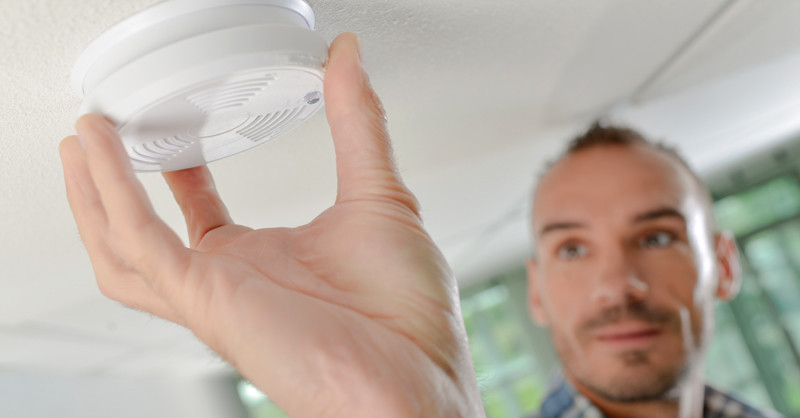
Temperatures are dropping and Queenslanders are looking for ways to stay warm this winter. But there's one important thing you should do before dusting off your heater: test and clean your smoke alarms.
Appliances like heaters can pose a fire hazard. The Queensland Fire Department (QFD) reported 468 housefires during winter last year.1 No matter the temperature outside, the risk of housefires remains and working smoke alarms can save lives.
Property owners, managers, tenants and residents have shared responsibility for smoke alarms in rental properties. Familiarising yourself with smoke alarm requirements is one thing you can do to stay safe this winter.
Smoke alarm requirements in rental properties
All rented homes in Queensland must have interconnected, photoelectric smoke alarms installed. This includes:
- houses
- townhouses
- units
- apartments
- some types of moveable dwellings
- secondary dwellings (e.g. granny flats).
Smoke alarms must comply with Australian Standard (AS) 3786-2014. You can tell whether smoke alarms are compliant by looking for the ‘AS 3786-2014' marking, which may be found on the inside or outside.
The condition and presence of smoke alarms should be noted in the Entry condition report (Form 1a). Smoke alarm systems must meet additional criteria that can be found on our smoke alarms page.
Smoke alarm requirements in caravans
Caravans are considered a type of ‘moveable dwelling’ under the Residential Tenancies and Rooming Accommodation Act 2008. However, caravans and motorhomes have their own smoke alarm requirements in Queensland.
Caravans and motorhomes must have compliant smoke alarms installed the first time they are registered, or when the registration is transferred (e.g. when the caravan is sold). From 1 January 2027, all caravans and motorhomes will be required to have smoke alarms installed.
Smoke alarm requirements in rooming accommodation
Rooming accommodation providers must comply with the relevant smoke alarm legislation. Rules may differ depending on the type of building that’s being rented out.
Entry notices to service or install smoke alarms
The property owner/manager must issue an Entry notice (Form 9) and give proper notice to enter a rental property and carry out work on smoke alarms. Repairs to non-functioning smoke alarms may be considered emergency repairs.
Tenants/residents must report faulty smoke alarms to the property manager as soon as possible so they can be repaired within a reasonable timeframe.
Testing and cleaning smoke alarms
Property owners/managers and tenants/residents share the responsibility for testing and cleaning smoke alarms:
- Property owners/managers are responsible for installing compliant smoke alarms. They’re also required to test smoke alarms within 30 days before a lease begins or is renewed.
- Tenants/residents are responsible for testing and cleaning smoke alarms during the tenancy. This must be done at least once every 12 months.
You don’t need to be a qualified person to test and clean a smoke alarm. Follow the manufacturer’s instructions or visit the QFD’s smoke alarm page for more information.
More information
Smoke alarm legislation is administered by the Queensland Fire Department. Watch a guest from QFD share tips in our webinar on smoke alarm law changes for more information.
If you have questions about smoke alarm requirements in a rental property, visit the smoke alarm page or contact us.
1Total number of residential structure fires for June, July and August 2024. Data sourced from the Queensland Fire Department on 18/02/2025.
Note: While the RTA makes every reasonable effort to ensure that information on this website is accurate at the time of publication, changes in circumstances after publication may impact on the accuracy of material. This disclaimer is in addition to and does not limit the application of the Residential Tenancies Authority website disclaimer.

